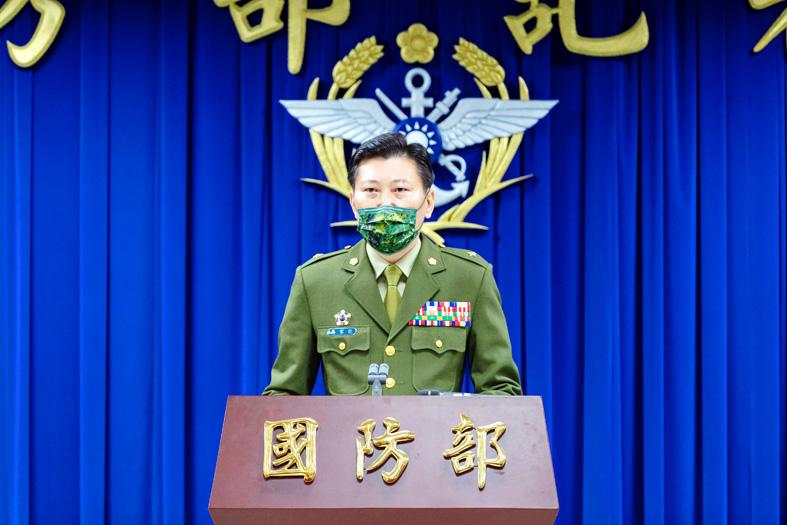The military has finalized a plan to extend the length of reservist training from next year in the hope of improving the combat readiness of reserve forces, a military official said yesterday.
Reservists are to undergo two weeks of training, instead of five to seven days, and they can be asked to train two years in a row rather than every other year, said Ma Chia-lung (馬家龍), deputy head of the Ministry of National Defense’s All-out Defense Mobilization Office.
The military is also to scale up reservist training by doubling the time spent on required combat training, such as rifle shooting, to maintain basic combat skills, he said.

Photo courtesy of the Ministry of National Defense
For example, reservists now undergo 12 hours of rifle training, firing 86 rounds, but next year, they would be required to train for 28 hours and fire 183 rounds, Ma said.
The plan, to be implemented on a trial basis, was devised after the military last year said that it wanted to ensure that the nation’s reserve forces could reliably back up regular soldiers amid an escalation of Chinese military maneuvers near Taiwan.
Reservist training includes specialty retraining, firearms training, combat training, combined training, and disaster prevention and relief training, which are necessary for combat operations and disaster relief, the ministry said.
While the training periods for reservists would be longer and more intense under the new guidelines, they would, over time, not require much more training than is currently required.
Presently, former soldiers undergo five days of reservist training every two years, while former officers undergo seven days of training.
The training, which takes place at a military base near the reservist’s residence, aims to maintain their basic combat skills.
They are requried to report for up to four training sessions in the eight years after they are discharged from active duty.
However, under the new rules, they would only need to report for two training sessions, which could be fulfilled in consecutive years.
A trial of the new rules is to take place in the first three quarters of next year at 25 military camps, where about 15,000 reservists discharged from the military within the past eight years would be trained, Ma said.
The military would review the outcomes in the fourth quarter before fully commiting to the program, he said.

CALL FOR SUPPORT: President William Lai called on lawmakers across party lines to ensure the livelihood of Taiwanese and that national security is protected President William Lai (賴清德) yesterday called for bipartisan support for Taiwan’s investment in self-defense capabilities at the christening and launch of two coast guard vessels at CSBC Corp, Taiwan’s (台灣國際造船) shipyard in Kaohsiung. The Taipei (台北) is the fourth and final ship of the Chiayi-class offshore patrol vessels, and the Siraya (西拉雅) is the Coast Guard Administration’s (CGA) first-ever ocean patrol vessel, the government said. The Taipei is the fourth and final ship of the Chiayi-class offshore patrol vessels with a displacement of about 4,000 tonnes, Lai said. This ship class was ordered as a result of former president Tsai Ing-wen’s (蔡英文) 2018

‘SECRETS’: While saying China would not attack during his presidency, Donald Trump declined to say how Washington would respond if Beijing were to take military action US President Donald Trump said that China would not take military action against Taiwan while he is president, as the Chinese leaders “know the consequences.” Trump made the statement during an interview on CBS’ 60 Minutes program that aired on Sunday, a few days after his meeting with Chinese President Xi Jinping (習近平) in South Korea. “He [Xi] has openly said, and his people have openly said at meetings, ‘we would never do anything while President Trump is president,’ because they know the consequences,” Trump said in the interview. However, he repeatedly declined to say exactly how Washington would respond in

WARFARE: All sectors of society should recognize, unite, and collectively resist and condemn Beijing’s cross-border suppression, MAC Minister Chiu Chui-cheng said The number of Taiwanese detained because of legal affairs by Chinese authorities has tripled this year, as Beijing intensified its intimidation and division of Taiwanese by combining lawfare and cognitive warfare, the Mainland Affairs Council (MAC) said yesterday. MAC Minister Chiu Chui-cheng (邱垂正) made the statement in response to questions by Democratic Progressive Party (DPP) Legislator Puma Shen (沈柏洋) about the government’s response to counter Chinese public opinion warfare, lawfare and psychological warfare. Shen said he is also being investigated by China for promoting “Taiwanese independence.” He was referring to a report published on Tuesday last week by China’s state-run Xinhua news agency,

‘ADDITIONAL CONDITION’: Taiwan will work with like-minded countries to protect its right to participate in next year’s meeting, the foreign ministry said The US will “continue to press China for security arrangements and protocols that safeguard all participants when attending APEC meetings in China,” a US Department of State spokesperson said yesterday, after Beijing suggested that members must adhere to its “one China principle” to participate. “The United States insists on the full and equal participation of all APEC member economies — including Taiwan — consistent with APEC’s guidelines, rules and established practice, as affirmed by China in its offer to host in 2026,” the unnamed spokesperson said in response to media queries about China putting a “one China” principle condition on Taiwan’s